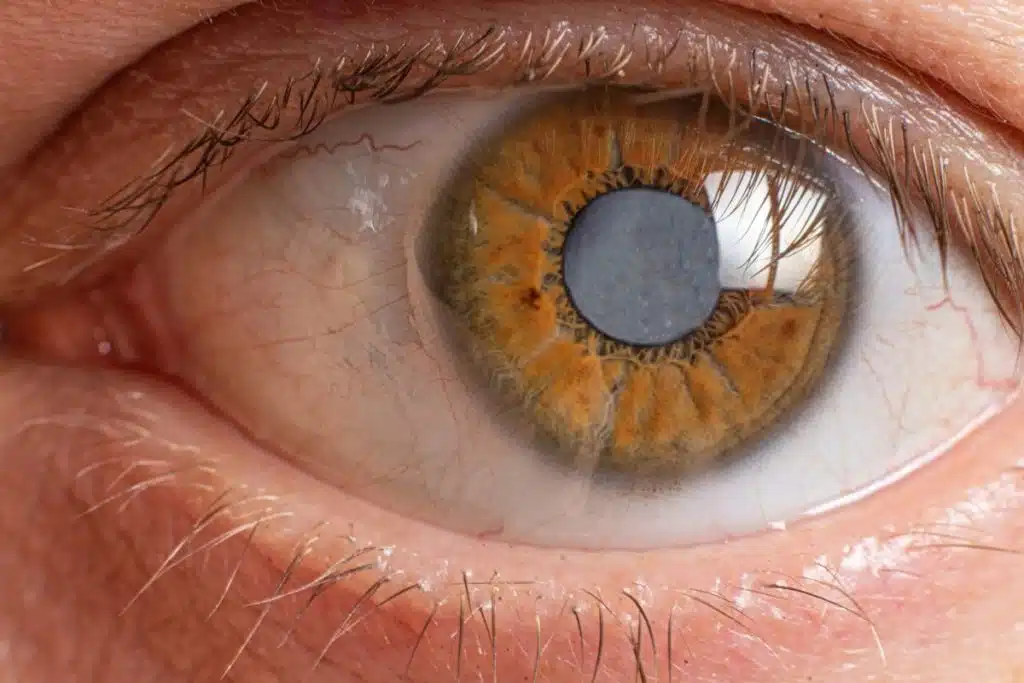
Medicare coverage for cataract surgery is an important issue for many Americans afflicted with this prevalent age-related condition. The general answer is yes, Medicare does cover cataract surgery and related services. However, understanding the specifics of that coverage can be complicated.
In this blog post, we will discuss the details of when and how Medicare covers cataract surgery.
What Are the Medicare Requirements to Cover Cataract Surgery?
Cataract surgery is a safe and common procedure to remove the clouded lens of the eye. The first step is to make a very small incision in the cornea. Next, surgeons use either a manual method with an ultrasonic probe or a femtosecond laser to break up the cataract into tiny microscopic particles. This process is called phacoemulsification.
Afterward, an intraocular lens (IOL) is inserted through this incision and carefully placed into its permanent position within the eye. The incision does not require stitches and heals quickly due to the natural outward pressure of the eye which keeps it tightly closed. The whole procedure usually takes only about 15 minutes and is done as an outpatient procedure.
Medicare covers cataract surgery if it is deemed to be medically necessary for a patient’s health. Standard cataract surgery is covered, with the option of being performed using traditional surgical techniques or lasers. It is important to note that Medicare’s coverage is only partial and subject to deductibles, copays, or coinsurance.
Which lenses for cataract surgery are covered under Medicare?
For cataract surgery, Medicare covers the cost of the “entry level” intraocular lens (IOL). This type of lens is a single-vision lens, designed to correct only distance vision. It does not correct astigmatism, nearsightedness, or presbyopia. Single-vision lenses provide good vision when looking straight ahead but can cause problems with seeing clearly at different distances or in low light conditions.
As technology has advanced, newer IOLs are now available which can correct astigmatism, nearsightedness and presbyopia and provide better vision at all distances and in lower light conditions. However, these lenses are typically more expensive than the entry level IOLs covered by Medicare and they are not currently covered by Medicare.
Which Parts of Medicare Do You Need For Cataract Surgery?
Most Medicare beneficiaries will need Part B, also known as Original Medicare, to cover their cataract surgery. Medicare Part B covers doctor visits and outpatient services. If a patient has a supplemental plan through another insurance provider or an employer-provided policy, it may cover some or all of the additional costs not covered by Medicare Part B.
There are also Medicare Advantage (MA) plans, which are private insurance plans approved by Medicare. Medicare Advantage plans also provide coverage for cataract surgery, but the extent of coverage varies from plan to plan.
Will Medicare Provide Vision Coverage After Cataract Surgery?
After cataract surgery, there are still some costs associated with recovery that Medicare will cover. Medically necessary follow-up appointments and any medications prescribed by a doctor are all covered by either Medicare Part D or a Medicare Advantage plan with prescription drug coverage. This includes any drops, antibiotics or other medications that may be necessary to help correct any post-surgery complications or problems.
Those who have undergone cataract surgery may also get one pair of glasses with standard frames or one set of contacts prescribed by their doctor from a Medicare-approved supplier to aid in their recovery at no additional cost. However, routine eye exams and corrective lenses not related to the cataract surgery itself are not covered by Medicare.
It is important for those who have recently had cataract surgery to take advantage of the coverage provided by Medicare to ensure that they properly recover from their procedure without incurring extra costs.
Frequently Asked Questions About Cataract Surgery
What are the symptoms of cataracts?
The most common symptoms of cataracts include blurred vision, difficulty seeing at night, colors appearing to be faded or yellowed, double vision and increased sensitivity to glare.
What is the recovery time for cataract surgery?
Patients will be able to return home the same day of their surgery, and most will experience improved vision the day after the procedure. However, full recovery may take up to several weeks.
Read more about recovering from cataract surgery
Do I need to have both eyes operated on at the same time?
Not at all. In fact, it is not recommended to have both eyes done on the same day. Each eye should be allowed to heal separately before undergoing surgery on the other eye.
Does cataract surgery hurt?
Cataract surgery is a safe and painless procedure. To ensure the patient’s comfort, eye drops or a local anesthetic are administered to numb the eyes before the start of surgery. You may also be offered a sedative before the procedure to help you relax.
Schedule a Cataract Evaluation Today
Cataract surgery can provide improved vision and quality of life for those affected by age-related vision changes. At Berkeley Eye Center, we have been working with patients throughout the Houston area for over 60 years, setting standards for cataract care in Texas. We use the most advanced technology and techniques to ensure our patients receive the best possible care.
Schedule your cataract evaluation with Berkeley Eye Center today by booking an appointment online or calling us at (713) 526-1600. Our team is here to answer any questions or concerns you may have about cataract surgery or other treatments we offer. Let us help protect and improve your vision!
